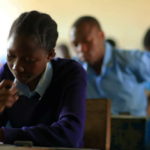
The strength of tomorrow will not be in terms of population, land area, financial assets, or the size of armies, but rather in scientific and technological capabilities, and possessing these capabilities can only be achieved through scientific progress and the ability to compete. This is the key to facing the upcoming challenges, and this key can only be possessed by a developed educational system.
THE CHALLENGES of the future can only be confronted by knowledgeable and educated societies, knowledgeable in the sense of cultural and technological literacy, and educated in the sense of there being a minimum level of scientific competencies among those in positions of responsibility.
Arab education, in its current state, and despite all efforts and experiences in development, is below expectations: it has scored quantitative attainments but has not achieved scientific, economic or security progress, nor has it fostered a strong scientific and technological underpinning. We still depend on others for nutrition, goods, medicine and armaments.
While it has scored successes in immunizing our youth and protecting them from extremist ideology, it has not succeeded in correcting misconceptions about Islam, nor has it supported national efforts in development and modernization projects or the promotion of the values of freedom and human rights, especially with regard to the status of women and their general participation in society.
Our education systems have also failed to develop among student critical thinking and the ability to evaluate. We are, today, in dire need of a firm and decisive political will, coupled with a cooperative, insightful and conscious societal investment in reformulating the education system, both in form and content. Money does not constitute any barrier to this task since a bad education can only be more costly in the medium and long term.
We need an education that takes away the apprehension that the rest of the world feels towards our youth, our Islam and our culture
We need an education that cherishes and values our youth in life, and encourages them towards endeavour and productivity, one that stimulates their energies towards creativity, innovation and discovery. We need an education that embraces man as a creature that is honored by his Creator, and one that instills in the hearts of His students love, tolerance and the acceptance of the other, in a spirit of hope and joy, an education that deepens the sublime values of our great religion in the hearts of our youth, for our Messenger came as a mercy to the worlds.
We want an education that teaches our children that their greatest jihad is in the fields of science, knowledge, creativity, scientific discovery, and endeavours that are beneficial to their nations and for humanity. We need an education that takes away the apprehension that the rest of the world feels towards our youth, our Islam and our culture, and equally one that removes the concerns of our youth that we are being targeted by global conspiracies and schemes!
It falls to us to teach how to translate these values and principles into educational curricula
Our education must correct our students’ view of the civilized West and remove feelings of hatred from their souls. The West is not a lurking enemy, a hateful crusader, or a pornographic materialist, as our public discourse maintains. The West is not responsible for our conditions that we complain about, as we claim. We alone are responsible for this,
and your Lord does not oppress the servants.
He sent our Messenger to perfect praiseworthy morals and call for wisdom, good preaching, and a constructive dialogue that accepts the other. It therefore falls to us to teach how to translate these values and principles into educational curricula, by promoting a culture of dialogue, and by consolidating a culture of tolerance.
We can do this by including in the curricula a number of constructed courses that immunize students from hatred, extremism and violence. These courses should include the following features:
1– A culture legitimising difference: As an educational, moral and cognitive necessity, our task is to inculcate the belief that differences among human beings in faith, culture, sect and belief, is part of the divine will and an established universal fact, since Almighty God created them diverse so that they may compete in the building of the earth, in the advancement of the sciences, in knowledge, discovery, and the development of humanity.
Thus we have to accept the other as he is, and coexist with him in the cause of the common benefit, nor is it my business as a Muslim to hold the other accountable for his belief – that is for the Almighty God alone.

Suggested Reading
2 – A culture of tolerance: We require of religious and media education and discourse to promote the concept of religious and human tolerance, whether this be between the constituents of a single society, or between Arab, Islamic and human societies in general. We require it to correct the stereotypes that have become lodged in the hearts of students towards other peoples due to the negative media coverage.
3 – A culture of self-criticism, questioning, accountability, acknowledgment of error, and a readiness to make apologies that are sincere. Critical thought is absent in Arab education in that criticism is launched at those of other cultures who are held to be responsible for our backwardness, and this despite the fact that self-criticism is one of the foundations of our religion, which commands us to be fair and just, even with the opponent.
4– Courtesy and the ethic of dialogue. The point of a dialogue, if it is to be fruitful, is to reach a common space with the other and co-operate with him, not score a victory and overwhelm him.
5 – The teaching of the arts.
